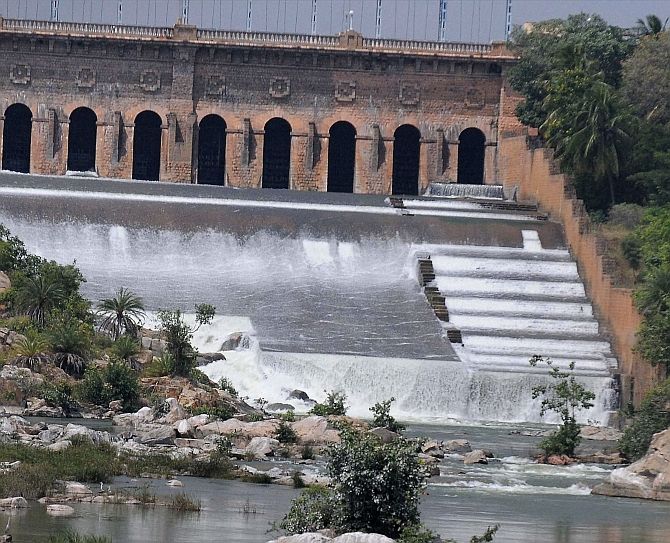The Supreme Court on Tuesday retained its direction to Karnataka to release 2000 cusecs of Cauvery water per day to Tamil Nadu till further orders and asked the two governments to ensure peace and harmony, saying citizens should not become law unto themselves.

A three-judge bench headed by Justice Dipak Misra, which commenced the crucial hearing on various issues arising out of the dispute between Tamil Nadu and Karnataka over sharing of Cauvery waters, said it first intended to adjudicate the issue of maintainability of appeals filed by both the states and Kerala against the tribunal's 2013 award.
"We intend to first adjudicate issue of maintainability of appeals filed by Karnataka, Tamil Nadu and Kerala. At this juncture, the interim order dated October 4 directing Karnataka to release 2000 cusecs of water per day to Tamil Nadu will continue till further orders," the bench also comprising Justices Amitava Roy and A M Khanwilkar said.
The bench said "morality of respect for both the states, among people of both the states and properties, should be maintained".
The court also noted the submission of Karnataka that it has complied with the earlier order of releasing 2000 cusecs of water to Tamil Nadu.
Both Karnataka and Tamil Nadu said they were in dire need of water, which was even supported by Attorney General Mukul Rohatgi.
During the hearing, Rohatgi submitted that the apex court-appointed Supervisory Committee, formed to inspect Cauvery basin to assess the ground realities in the region, has submitted its report.
The bench said it would first go into the issue of maintainability of appeals filed by Karnataka, Tamil Nadu, Kerala and Puducherry against the award of tribunal and then hear the arguments on the report filed by the committee.
The Attorney General said the appeals filed by the states were not maintainable as per article 131 and 262 of the Constitution and the provisions of Inter-state River Water Disputes Act, 1956.
He said as per the constitutional provisions, a decree passed by a tribunal will be like a decree of Supreme Court which cannot hear the appeals against its own order.
Senior advocate and noted jurist Fali S Nariman, appearing for Karnataka, said the appeals are maintainable as Supreme Court can only adjudicate the disputes between two states.
The hearing remained inconclusive and will continue on Wednesday when Tamil Nadu will advance its arguments on maintainability of appeals.
The apex court-appointed panel had yesterday in its finding suggested doing away with "outdated and unscientific water application techniques" to resolve the wrangle, saying both Karnataka and Tamil Nadu were facing water shortage which created unemployment and financial hardship for the people.
It had said the neighbouring riparian states needed to appreciate interest of Tamil Nadu and Puducherry to protect their established irrigation and Karnataka's aspirations for development and educate their people accordingly.
The panel in its 40-page report has noted that farmers in both states were in severe distress and adequate crop compensation must be provided to them.
The Supreme Court had on October 4 directed Karnataka to release 2,000 cusecs Cauvery water every day to Tamil Nadu from October 7 to 18 and deferred its earlier order asking the Centre to set up Cauvery Water Management Board till it finally decided on appeals relating to the age-old water dispute.
The apex court had agreed to the suggestion that a Supervisory Committee, comprising officials and technical experts from the Centre, Tamil Nadu, Karnataka, Kerala and Puducherry, be set up to inspect Cauvery basin for assessing ground realities.
On September 30, SC had directed Karnataka to discharge 6,000 cusecs water from October 1-6, warning it that no one would know when the "wrath of the law" would fall on it.
The apex court had also directed the Centre to establish the CWMB, saying once it was constituted, its team would visit the sites to take a prima facie view of the ground reality and submit a report.
On October 1, Karnataka had moved a review petition in the apex court against its three orders on Cauvery water release to Tamil Nadu and direction to the Centre to create the CWMB.
In its review petition, Karnataka said "grave miscarriage of justice" has been caused to it pursuant to the three apex court orders of September 20, 27 and 30, by which it was directed to release 6000 cusecs of water till October 6 and the Centre was to constitute the Board by October 4.










 © 2025
© 2025